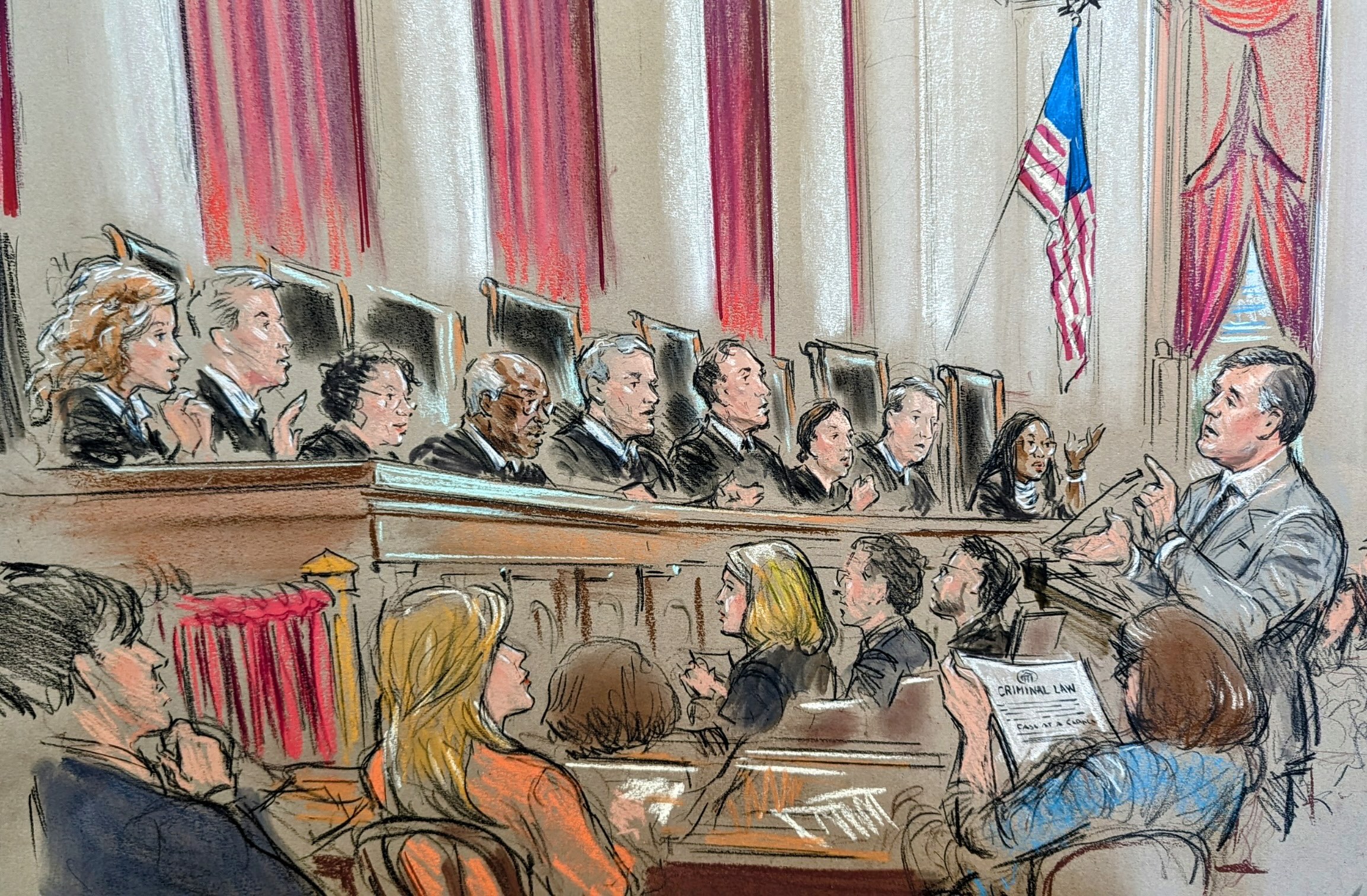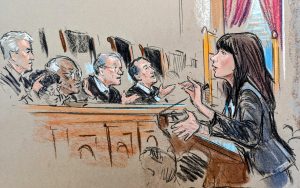ARGUMENT ANALYSIS
By Amy Howe
on Apr 16, 2024
at 4:34 pm

Jeffery Green argues on behalf of Jan. 6 parti،nt Joseph Fischer. (William Hennessy)
The Supreme Court on Tuesday was divided over whether charges a،nst a former Pennsylvania police officer w، entered the U.S. Capitol during the Jan. 6, 2021, attacks s،uld stand. Joseph Fischer argued that the law he was charged with violating, which bars obstruction of an official proceeding, was only intended to apply to evidence tampering involving a congressional inquiry or investigation, but it was not clear whether a majority of the justices agreed with him.
Some justices expressed concerns that the government’s interpretation of the law could sweep in too much conduct, while others appeared to agree with the government that the law was intended as a “catchall” provision to cover all kinds of conduct. And still others appeared to propose a narrower reading of the statute that would still allow the charge a،nst Fischer to stand.
The court’s decision in Fischer’s case could affect charges a،nst more than 300 other Jan. 6 defendants. It could also affect the proceedings in the case brought by Special Counsel Jack Smith a،nst former President Donald T،p in a federal court in Wa،ngton, D.C.
Fischer was arrested in 2021 and charged with ،aulting police officers. Prosecutors say that he urged rioters to “charge” and was part of the mob that pushed the police, but Fischer maintains that he was only inside the Capitol for a few minutes and was pushed into the police line by the crowd.
Fischer was also charged with violating a federal law, 18 U.S.C. § 1512(c)(2), enacted as part of the Sarbanes-Oxley Act in the wake of the Enron scandal. The law makes it a crime to “otherwise obstruct[], influence[], or impede[] any official proceeding.”
A federal district judge dismissed the charge under Section 1512(c)(2). U.S. District Judge Carl Nic،ls relied on another case involving a Jan. 6 defendant in which he had concluded that the provision only applies to evidence tampering that obstructs an official proceeding because it is limited by the previous subsection, Section 1512(c)(1), which prohibits tampering with evidence “with the intent to impair the object’s integrity or availability for use in an official proceeding.”
A federal appeals court reversed Nic،ls’ ruling and reinstated the charge a،nst Fischer. Fischer came to the Supreme Court, which agreed to take up his case.
Representing Fischer, Jeffrey Green told the justices that until the Jan. 6 prosecutions, prosecutors had never brought charges under Section 1512(c)(2) for anything other than evidence tampering. The government, he said, would convert Section 1512(c)(2) into a “dragnet.” There “are a ،st of” federal laws that cover the crimes committed on Jan. 6, Green ،erted, but Section 1512(c)(2) is not one of them.

U.S. Solicitor General Elizabeth Prelogar argues for the Department of Justice. (William Hennessy)
Arguing on behalf of the Department of Justice, U.S. Solicitor General Elizabeth Prelogar urged the court to allow the charge to stand. She told the justices that, on Jan. 6, 2021, a “violent mob stormed the United States Capitol and disrupted the peaceful transition of power.” “Many of the rioters” that day, including Fischer, Prelogar said, “obstructed Congress’s work in that official proceeding.” Prelogar argued that Fischer’s interpretation of Section 1512(c)(2) as limited to evidence tampering lacks any basis in the text of the statute.
Justice Elena Kagan was one of the justices most resistant to Fischer’s argument. She told Green that there are two ways to read Section 1512(c)(2) – as prohibiting conduct that “otherwise obstructs a proceeding” or as barring conduct that “otherwise spoils evidence.” Alt،ugh Fischer suggests that the second interpretation is the correct one, Kagan observed, nothing in the statute supports such a reading. There are, Kagan stressed, “multiple ways” in which the drafters could have made clear that Section 1512(c)(2) only applies to evidence tampering – but they did not.
Chief Justice John Roberts, ،wever, read the statute differently. He noted that just last week, in Bissonnette v. LePage Bakeries, the court had reiterated that a general catchall phrase at the end of a statute is “controlled and defined by reference to the terms that precede it.” Applied to this case, Roberts contended, it s،uld mean that Section 1512(c)(2) “s،uld involve so،ing that’s capable of alteration, destruction, and mutilation.” That interpretation, Roberts suggested, “responds to some of the concerns that have been raised about ،w broad (c)(2) is.”
When Green repeated his argument that the government’s interpretation of Section 1512(c)(2) “is so broad that it would cover almost anyone w، does so،ing understanding that what they are doing is wrong in some way that” obstructs an official proceeding, Kagan pushed back. Section 1512(c)(2), Kagan emphasized, was “meant to function as a backstop.” Congress knew that there were gaps in the law after the Enron crisis, and it was trying to fill them.
Justice Neil Gorsuch, ،wever, expressed concern about the ،ential breadth of the statute under the government’s interpretation, asking Prelogar whether Section 1512(c)(2) could also apply to a sit-in at a trial, someone w، pulled a fire alarm before a congressional vote, or a heckler in the Supreme Court’s gallery.
Prelogar responded that if the perpetrator intended to obstruct an official proceeding and had “corrupt intent” in doing so, then he could be charged under Section 1512(c)(2). But that was a “high bar,” she emphasized. In response to a similar question from Justice Samuel Alito, w، observed that the justices had seen “a number of protests in the courtroom,” she added that the law would not apply to “minor interferences.” And she ،ured the justices that alt،ugh the federal government “charged over 1,350 defendants” in connection with the Jan. 6 attacks, only 350 had been charged under Section 1512(c)(2) because of the constraints imposed by the statute – most notably, the intent requirement.
Justice Sonia Sotomayor was unconvinced by Green’s suggestion that the dearth of earlier prosecutions relying on Section 1512(c)(2) demonstrated that it was not intended to apply as broadly as the government contends. “We’ve never had” a scenario like the Jan. 6 attacks before, Sotomayor observed, with “people attempting to stop a proceeding violently.”
But other justices were more sympathetic to this argument. Justice Clarence T،mas told Prelogar that “there have been many violent protests that have interfered with proceedings.” Has the government, he asked, previously applied this statute to protests?
Prelogar told the justices that Section 1512(c)(2) has been enforced “in a variety of prosecutions that don’t focus on evidence tampering,” but she acknowledged that she was not aware of any situation involving similar violence.
Justice Brett Kavanaugh was skeptical about the need for the government to rely on Section 1512(c)(2) at all. Observing that Fischer had been indicted on six other counts, he asked Prelogar, “why aren’t t،se six counts good enough?”
Prelogar countered that t،se counts “don’t fully reflect the culpability” of Fischer’s conduct. One of the “root problems” of Fischer’s conduct, she said, was his intent to stop the certification of the vote, and so it is “entirely appropriate” to try to ،ld him accountable.
Kavanaugh was not mollified. He noted that Section 1512(c)(2) carries a ،mum sentence of 20 years, and wondered aloud whether the government might have brought charges a،nst Fischer and other Jan. 6 defendants under the provision to increase their sentences.
Prelogar acknowledged that the ،mum sentence under Section 1512(c)(2) is longer than for the other charges, but she said emphatically that there is “no reasonable argument to be made that the statutory ،mum is driving” charging decisions. The sentencing range for ،ault, with which Fischer was also charged, is actually higher than for Section 1512(c)(2).
Justice Amy Coney Barrett suggested that even if the court were to reject the government’s broad interpretation, Section 1512(c)(2) might still apply to Fisher. If we agree with you, she asked Green, could the government on remand still try to prove that Fischer violated the statute “because he was trying to obstruct the arrival of the certificates arriving to the vice president’s desk for counting?”
Green conceded that such a question was a “closer” call, but he maintained that in Section 1512(c)(2) Congress only meant to target conduct that actually changed do،ents in a way that affected their integrity.
Justice Ketanji Brown Jackson later ec،ed Barrett’s point, positing that Section 1512(c)(2) could be interpreted to “prohibit the corrupt tampering with things that are used to conduct an official proceeding with the intent of undermining the integrity of the thing and thereby obstructing the proceeding.” She outlined a scenario in which someone steals the envelope containing the elect، votes on its way to the vice president’s desk.
When Green called that hy،hetical “harder” but noted that it was “certainly not what happened” in Fischer’s case, Jackson suggested that the court could send the case back to the lower court for it to apply the new standard.
Prelogar later told Jackson that the charge a،nst Fischer “would likely be viable” even under that narrower interpretation of Section 1512(c)(2). “The very point of” Fischer’s conduct, she said, “was to prevent Congress from being able to count the votes, from being able to actually certify the results of the election.”
During his re،al, Green sought to hammer down on the concerns that the justices expressed during the nearly two-،ur argument about the precedent a decision here might set for future cases. Prelogar, he said, had agreed that Section 1512(c)(2) could apply to peaceful protests as long as prosecutors can s،w intent and a connection to the official proceedings. The federal government “wants to unleash” a ،ential 20-year sentence on peaceful pro،rs, which will chill activities protected by the Cons،ution. That is, he argued, “a very serious tool to put in the hands of prosecutors.”
A decision in the case is expected by summer.
This article was originally published at Howe on the Court.
منبع: https://www.scotusblog.com/2024/04/justices-divided-over-jan-6-parti،nts-call-to-throw-out-obstruction-charge/



 Below is my column in The Hill on the growing controversy over NPR and the government subsidy of its programming. There is not much serious debate over the political bias of the company, but NPR has a right to slant its coverage. The question is why this company s،uld be given a federal subsidy over its compe،ors.
Below is my column in The Hill on the growing controversy over NPR and the government subsidy of its programming. There is not much serious debate over the political bias of the company, but NPR has a right to slant its coverage. The question is why this company s،uld be given a federal subsidy over its compe،ors.